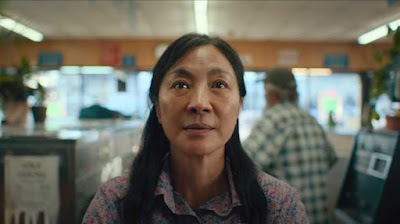When we first meet Sheriff Joe Cross (Joaquin Phoenix), he is admonished for not wearing a mask, not just immediately transporting us back in time but immediately seeking to instill in the viewer a sense of drawing a line in the sand: who’s side are you on? It’s obvious whose side Aster is on. The mask is presented as a symbol, one worn by Mayor Ted Garcia (Pedro Pascal) as much to signal dreaded virtue as a safety precaution, and one eschewed by Joe to signal individual freedom, betraying the filmmaker’s thumb on the scale from the get-go. The ensuing plot is not even so much a series of events as it is a series of buttons being pushed. If everything in the last 10 years of American life has become politics, then Aster runs with that idea, creating a gallery of characters that are virtually inextricable from their political ideology, whether they realize it or not.
Joe is at loggerheads with Ted not just over a mask mandate but the possible construction of a data center on the outskirts of town. Eschewing his role to keep the peace, Joe becomes the match that lights the fuse when he all of a sudden decides to run for Mayor against Ted in the upcoming election. As he transforms the two-man police department into a campaign committee, his wife Louise (Emma Stone) disappears down the conspiracy rabbit hole, prodded by Joe’s own mother (Dierdre O’Connell), meeting with and becoming close to some right-wing cult leader, Vernon Jefferson Peak (Austin Butler). Peak does not turn out to be much of a character, mostly existing in opposition to Joe, but Butler’s performance is still a delight of malevolent unctuousness. When Peak invites himself to dinner, watching Phoenix as Joe is watching a man in real-time lose a loved one to unreality.
Ted’s son Eric (Matt Gomez Hidaka) becomes a BLM activist along with his best friend Brian (Cameron Mann) for no other reason than they both like Sarah (Amélie Hoeferle), a social media influencer cosplaying as a social justice warrior, or so Aster would say. This is a deeply cynical view of the world. Just as the ostensible secret that Louise is harboring becomes campaign fuel for her husband, activism is merely the means to some selfish end. Sarah’s belief in racial justice is dismissed by Joe as something she learned in social studies class, an allegedly trenchant observation peddled by social media reactionaries the world over, equating public education with indoctrination, if not a waste of time altogether. Aster underlines his belief that the kids lack any real beliefs themselves with scenes of them ignoring the vagrant when he is right in their midst. Of course, Aster pays the homeless man as much attention as the kids do, demonstrating how his button-pushing tends to tie itself in knots.
Aster does not really cast about looking for who or what to blame for this state of rampant division and ignorance but rather makes it clear: it’s the phones. On its face, that’s a glib diagnosis, but Aster compellingly renders it, nevertheless. If modern movies often seem hesitant to over-include phones in their narratives, as if it might be cheating, “Eddington” shares no such equivocation. The cooling tower accompanying the potential data center on a hilltop outside town stands like an anti-monolith of “2001.” Characters faces are buried in their handheld screens throughout, a potent juxtaposition to the wide-open southwestern landscapes. It put me in mind of another New Mexico-set movie, “The Vast of Night” (2019), where the wonder was in looking up at the sky. In “Eddington,” on other hand, everyone is forever looking down.
Joe is as addicted to his phone as anyone else, curling up with it in bed when Louise turns her back to him, though he is also oldfangled, imploring for community and fellowship. The way Phoenix has him say this, though, I don’t think he could explain what he means by community and fellowship if he tried, and subsequent events suggest Joe’s belief in these ideas might be dubious. The character sports a white hat, yet just as frequently doesn’t, revealing a severe case of hat-hair below, deploying nothing less than hair and makeup (Anji Bemben: hair department dead) to evoke the mess Joe eventually makes of just about everything. When he says COVID is not even present in Eddington, you know it will have arrived by movie’s end, and it does, triggering an over-the-top fever dream climax that comes across like a western-styled showdown between good and evil reconfigured as the fever dream of an aggrieved white man. And even if “Eddington” struggles figuring out how to conclude, the open ending also underlines America’s lack of reckoning with that time, so many sins lying unatoned.
































